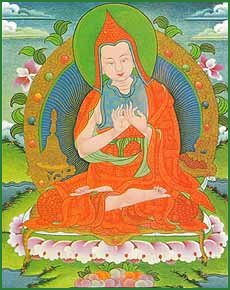The Great Chariot
by Longchenpa | 268,580 words
A Commentary on Great Perfection: The Nature of Mind, Easer of Weariness In Sanskrit the title is ‘Mahāsandhi-cittā-visranta-vṛtti-mahāratha-nāma’. In Tibetan ‘rDzogs pa chen po sems nyid ngal gso’i shing rta chen po shes bya ba ’...
Part 1b.1b - How consciousness does accumulates karma
Now, as for how these consciousnesses accumulate karma:
By the coarsened vice and virtue of conceptualized attachment
Alaya supports the seeds of formations of desire.
Luminous non-conceptualized appearances
Become the formations of the realm of form.
One pointed non-thought depends on habits of formlessness.
The removable two obscurations, the nature of samsara,
Are an essential part of their environment.
With the false conceptions that are the coarse grasping and fixation of mind, we fall into the good and bad karma of the desire realm.
If samadhi that has not accomplished the natural state meditates in a state in which conceptualization of apparent objects as appearances does not arise, karma of the arising of the realm of pure form collects in alaya.
By meditating in complete non-thought, in the sense of blocking apparent objects, seeds of being born in formlessness are heaped up in alaya.
The chapter on “ultimatesamadhi” of the Jewel Heap Sutra says:
Whoever is afflicted by desire produced by discursive thoughts, in turn produced by formations of good, bad, and indifferent, falls into the desire realm.
Whoever, with a mind of complete non-thought that does not discard objects, produces one- pointed yogic union; since this is separate from the essence of Dharma, it is conditioned formation of the form realm.
Whoever is within neither form or desire, not seeing the tracks of mind’s objects, and becomes accustomed to this by looking at it a great deal, cycles in the formless realm.
By these they will never be liberated from these three realms of samsara. Therefore, hearing with true hearing, industriously meditate on what should be meditated on.
